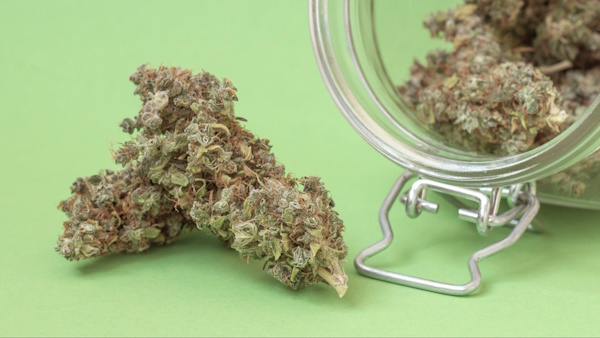Why Does Cannabis Make You Hungry?

One of the most well-known side effects of cannabis use is the increase in appetite, commonly referred to as "the munchies." Whether you're a seasoned user or new to cannabis, you’ve likely experienced or heard about this phenomenon. But what exactly causes this surge in hunger? Understanding the reasons behind cannabis-induced appetite can provide valuable insights into how cannabis interacts with our bodies and why it might be beneficial for certain medical conditions.
At TreeStorX, we believe in educating our New York City customers about the various effects of cannabis to help them make informed choices. By delving into the science behind why cannabis makes you hungry, we aim to shed light on this intriguing aspect of cannabis use. From the role of THC and the endocannabinoid system to hormonal influences and sensory enhancements, we'll explore the multifaceted reasons behind the munchies and how you can manage this effect to your advantage.
The Role of THC in Appetite Stimulation
The primary psychoactive compound in cannabis, tetrahydrocannabinol (THC), plays a central role in stimulating appetite. THC is the component responsible for the "high" associated with cannabis use, but it also has significant effects on various physiological processes, including hunger.
THC interacts with the brain’s endocannabinoid system, a complex network of receptors and neurotransmitters that regulate numerous bodily functions. One of the key components of this system is the CB1 receptor, which is found in high concentrations in the brain. When THC binds to CB1 receptors, it activates them, influencing various neural pathways and processes.
This activation of CB1 receptors by THC leads to increased appetite through several mechanisms. First, it enhances the release of the hormone ghrelin, which signals hunger to the brain. Additionally, THC increases the production of dopamine, a neurotransmitter associated with pleasure and reward, which can make eating more enjoyable. Finally, THC can amplify sensory perception, making food smell and taste better, further encouraging consumption. These combined effects explain why cannabis users often experience a heightened sense of hunger after consuming THC.
The Science of the Endocannabinoid System
The endocannabinoid system (ECS) is a complex network of receptors, enzymes, and endogenous cannabinoids that plays a crucial role in maintaining homeostasis within the body. This system regulates a variety of physiological processes, including mood, memory, pain sensation, immune response, and appetite. The ECS comprises two main types of receptors: CB1 receptors, primarily found in the brain and central nervous system, and CB2 receptors, located mainly in the peripheral organs and immune cells.
The ECS is deeply involved in hunger and metabolism. It helps regulate energy balance and food intake by interacting with various signaling pathways in the brain. When the body needs energy, the ECS activates mechanisms that promote feeding behavior and energy storage. This process involves the release of hormones and neurotransmitters that signal hunger and stimulate appetite.
Cannabis, particularly its active compound THC, influences the ECS by binding to CB1 receptors in the brain. This binding mimics the action of endocannabinoids, the naturally occurring compounds in the body that activate these receptors. When THC activates CB1 receptors, it enhances the release of the hormone ghrelin, known as the "hunger hormone," which increases appetite. Additionally, THC stimulates the release of dopamine, a neurotransmitter associated with pleasure and reward, making eating more enjoyable. This interaction between cannabis and the ECS explains why users often experience an increase in hunger after consuming cannabis.
Cannabis and Hormonal Influences on Hunger
Cannabis has a significant impact on hormones related to appetite, particularly ghrelin and leptin. These hormones play crucial roles in regulating hunger and satiety, influencing how much and when we eat.
Ghrelin, often referred to as the "hunger hormone," is produced in the stomach and signals the brain to increase appetite. When ghrelin levels rise, we feel hungrier and are more inclined to eat. Cannabis use, specifically the THC component, increases the levels of ghrelin in the body. This elevation in ghrelin is one of the primary reasons why cannabis users often experience an increase in hunger, commonly known as "the munchies." The heightened ghrelin levels signal to the brain that it's time to eat, leading to a stronger and more persistent feeling of hunger.
Leptin, on the other hand, is known as the "satiety hormone." It is produced by fat cells and helps to regulate energy balance by inhibiting hunger. When leptin levels are high, they signal to the brain that the body has enough energy stored, reducing the desire to eat. Cannabis use can interfere with the normal functioning of leptin. THC has been shown to decrease the effectiveness of leptin's signals, meaning the brain doesn't receive the usual message to stop eating. This reduction in leptin sensitivity further contributes to the increased appetite observed with cannabis use.
By affecting these key hormones, cannabis alters the natural regulation of hunger and satiety, leading to a stronger desire to eat and less effective signaling of fullness. This hormonal influence is a significant factor in the increased appetite experienced by cannabis users.
Psychological and Sensory Effects of Cannabis
Cannabis significantly enhances sensory perception, making food smell and taste more appealing. The interaction between THC and the brain's sensory pathways intensifies the aromas and flavors of food, leading to a more enjoyable and heightened eating experience. This sensory amplification is one of the reasons why cannabis users often find themselves irresistibly drawn to their favorite snacks, as the food seems more delicious and satisfying than usual.
In addition to the sensory enhancements, cannabis also affects psychological factors that contribute to an increased enjoyment of eating. One notable effect is mood enhancement. Cannabis can elevate mood by increasing the levels of dopamine, a neurotransmitter associated with pleasure and reward. When in a positive mood, individuals are more likely to enjoy their meals and feel a greater sense of satisfaction from eating. This mood lift, combined with the pleasurable sensory experience, creates a powerful incentive to consume more food.
The combined effect of these sensory and psychological changes leads to a significant increase in appetite. As food becomes more appealing and enjoyable, and mood enhancement boosts overall satisfaction, the drive to eat is amplified. This comprehensive influence on both the mind and senses explains why cannabis use often results in a marked increase in hunger and food consumption. By enhancing the pleasure derived from eating and making food more enticing, cannabis creates a compelling and multifaceted effect on appetite.
Understanding the Munchies with TreeStorX
Cannabis has a well-documented ability to stimulate appetite, often leading to the phenomenon known as "the munchies." This increase in hunger is primarily driven by THC's interaction with the brain's endocannabinoid system, influencing key hormones like ghrelin and leptin, and enhancing sensory perceptions and mood. By understanding the science behind why cannabis makes you hungry, consumers can better manage their experience and make informed choices about their cannabis use.
In the bustling city of New York, TreeStorX is dedicated to providing high-quality cannabis products and the knowledge needed to enhance your cannabis experience. Whether you’re seeking to benefit from the appetite-stimulating effects of cannabis for medical reasons or simply want to enjoy your favorite snacks, TreeStorX offers a wide range of strains to suit your needs. Visit our website or contact us today to explore our selection and place your order. Embrace the diverse effects of cannabis with confidence, knowing that TreeStorX is here to support you in New York City.



